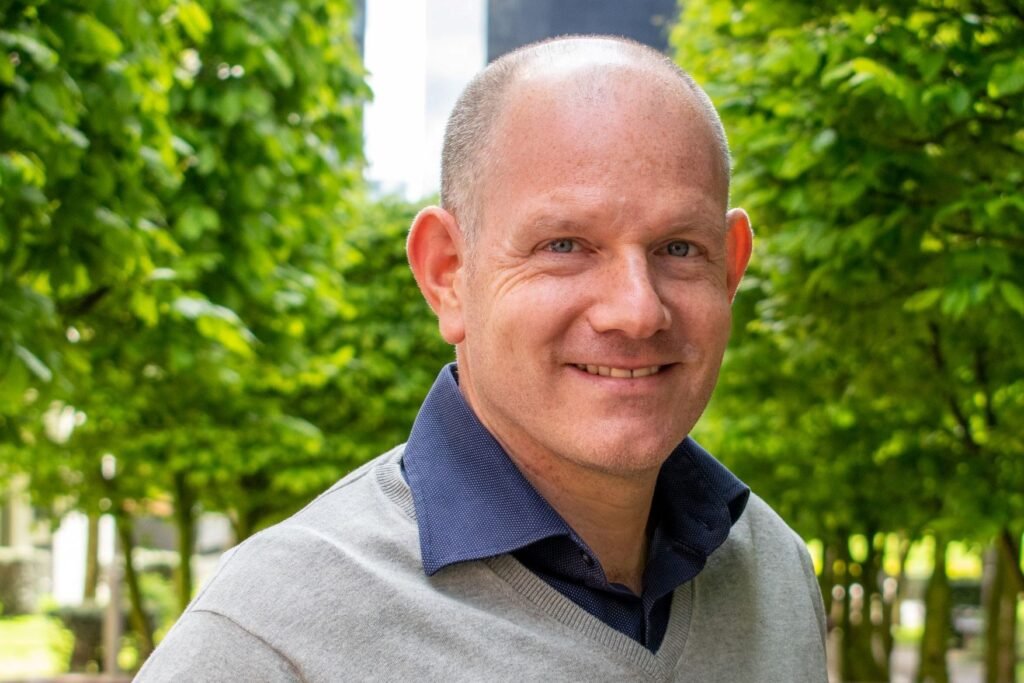It was supposed to be a make-or-break meeting. Scott Marshall, nervous and sleep-deprived, had driven four hours to Cambridge to pitch his fledgling lending business to the building society’s chief executive. Then disaster struck. As he waxed lyrical about his vision, Marshall accidentally knocked his coffee cup, drenching the executive’s pristine desk and immaculate suit.
Most would have considered the meeting a catastrophic failure. Instead, it became the origin story of an extraordinary business relationship. Today, the Cambridge Building Society is Roma’s largest funder, with a £120 million facility that has helped transform Marshall’s vision of supporting entrepreneurial property developers.
“I thought there was no way we’d ever do business after that,” Marshall recalls with a laugh. “But here we are.”
Roma’s success isn’t just about luck – it’s about understanding people. Marshall has developed a nuanced approach to property lending by identifying three distinct customer personas that traditional banks overlook.
At the heart of Roma’s strategy is the blue-collar property professional – the builder, joiner, plumber, and electrician with “dirty fingernails and broken teeth.” These are the craftsmen who live and breathe their projects but struggle to secure traditional financing.
“These are technically competent people who can’t easily go to a bank,” Marshall explains. “They’ve often worked for someone else for years and now want to scale up their own operations.”
Take Marshall’s example of a roofer who once worked on the Big Brother house and is still a Roma customer 12 years later. These professionals represent loyalty personified – once they find a supportive lender, they stick around.
Then there are the architects, quantity surveyors, and professional landlords. They understand property deeply, have teams to execute projects, and seek bridging finance to transform properties.
“They’re looking to add to their portfolio,” Marshall says. “Often starting with properties needing significant TLC, they become more ambitious as they gain experience.”
Once the fastest-growing segment, the third group are white collar other professionals, often doctors, lawyers, and finance directors seeking passive property wealth. However, rising interest rates and complex market conditions have made this approach less attractive.
“Pre-COVID, these professionals were everywhere,” Marshall notes. “Now, they’re realizing they can get better returns elsewhere.”
Marshall’s journey wasn’t solitary. Key influences shaped his approach, starting with his time at Together under Henry Moser, before he lost his job there in the wreckage of the 2008 financial crisis. Though the two don’t have any kind of direct financial relationship today, the giant of property lending still lives mortgage free somewhere in Marshall’s psyche.
“I still often ask myself, ‘What would Henry do?’” he reflects.
His silent partner Phil Hodari, founder and chairman of Pilot Group, a privately-owned group of technology businesses has been equally crucial. “Phil has given me tremendous autonomy,” Marshall says. “He’s let me run and grow the business exactly as I’ve needed to.”
Marc Goldberg, another significant influence from his time at Together, taught Marshall the importance of backing the right people. His core philosophy emerged: “A good borrower can create value from a bad asset. A bad borrower can destroy value in a perfect asset.”
Roma currently manages nearly a quarter of a billion of pounds of funding across almost 700 projects around the UK. The average project exposure is around £400,000, with a mix of 40% development projects, 40% bridging finance, and 20% buy-to-lets.
Marshall’s ambition is bold: becoming a billion-pound business within five years. He sees significant untapped potential, particularly in small-scale commercial development and reimagining urban spaces.
“We’re not even close to scratching the surface of what we can achieve,” he declares.
His current big idea that he thinks will propel Roma is a new Commercial Development Finance product—the first expansion of its RomaGROW range offering loans from £250,000 to £2.5 million, with finance available at up to 65% loan-to-gross development value (LTGDV). It’s designed to support experienced developers delivering new-build offices, warehouse and logistics units, as well as retail and mixed-use schemes up to 12,000sq ft.
“The UK’s industrial and logistics sector urgently needs more space, and this empowers developers to build the kind of infrastructure that fuels jobs, trade and investment in underserved areas.”
He describes how it’s already been successfully trialled, including a £2.33 million deal in Market Harborough, Leicestershire where Roma supported an 18-month loan to an experienced developer embarking on their first ground-up scheme—a project to deliver 11 new light industrial and warehouse units as part of the regeneration of Hermitage Business Park.
Roma re-launched its offering as part of a strategic reorganisation at the beginning of the year to streamline its services into three distinct product ranges: FLOW | GROW | PRO.
Marshall is acutely aware of the UK’s property challenges. Roma isn’t just a lending business – he sees it as part of a broader solution to a lack of appropriate space in commercial and housing, and he calculates that there are enough entrepreneurs needing support in this space.
The lending landscape is complex. Rising interest rates, inflation, and economic uncertainty create significant challenges. Yet Marshall sees opportunity where others see obstacles.
“In times of stress, our customers can buy better,” he explains. “When other lenders run for the hills, we see a chance to grab market share.”
Roma operates on two core mantras. First, “Treat every customer like they’re your grandparent.” Second, “Behave at work in a way that would make your mother proud.”
It’s this combination of hard-nosed financial acumen and genuine human connection that he says sets Roma apart. In fact the business is named after his grandparents, Rose and Max.
From a coffee-spilling moment to a £250 million operation, you could say that Scott Marshall’s journey exemplifies entrepreneurial resilience. Roma isn’t just lending money – it’s enabling dreams, one property project at a time.
As Marshall puts it: “We back good people looking to create wealth for themselves and their families.”
And sometimes, that journey begins with something as bizarre as a spilled cup of coffee.

